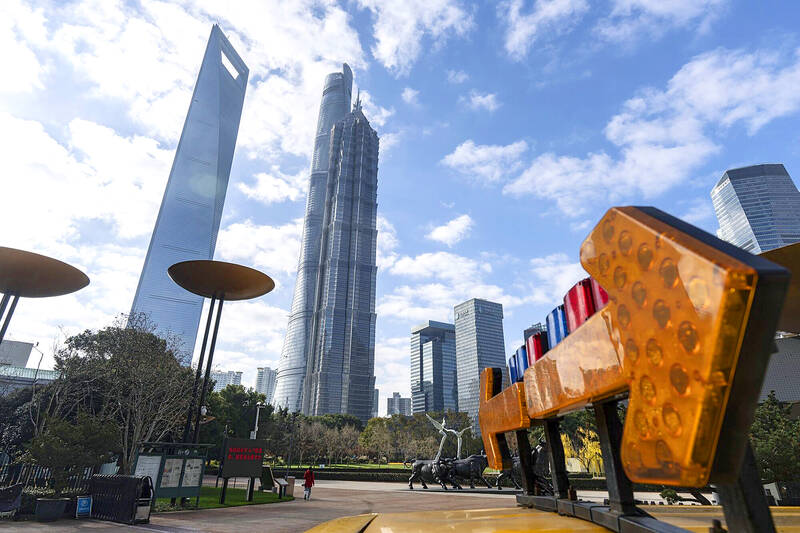China is to sharply increase funding from ultra-long treasury bonds this year to spur business investment and consumer-boosting initiatives, a state planner official told a news conference yesterday, as Beijing cranks up fiscal stimulus to revitalize its faltering economy.
Special treasury bonds would be used to fund large-scale equipment upgrades and consumer goods trade-ins, said Yuan Da (袁達), deputy secretary-general of the Chinese National Development and Reform Commission.
“The size of ultra-long special government bond funds will be sharply increased this year to intensify and expand the implementation of the two new initiatives,” Yuan said.

Photo: Bloomberg
Under the program launched last year, consumers can trade-in old cars or appliances and buy new ones at a discount, while a separate program subsidizes large-scale equipment upgrades for businesses.
Households would be eligible for subsidies to buy three types of digital products this year, including cell phones, tablets, smart watches and bracelets, Yuan said.
The commission last month said that Beijing had fully allocated all proceeds from 1 trillion yuan (US$136.68 billion) in ultra-long special treasury bonds last year, with about 70 percent of the proceeds financing “two major projects” and the remainder going toward the new initiatives.
Chinese leaders have pledged to “vigorously” boost consumption this year, raising expectations of more policy steps to spur demand and fight deflationary risks.
Millions of government workers across China were given surprise wage increases this week, people affected by the move said, as Beijing looks to boost spending.
China would also increase funding from special treasury bonds and expand the scope for another program that focuses on supporting key strategic sectors, said Zhao Chenxin (趙辰昕), vice head of the state planner.
The Chinese government has approved projects for this year worth 100 billion yuan under this scheme in advance, Zhao told the news conference.
The major programs refer to projects such as construction of railways and airports, development of farmland and building security capacity in key areas, official documents showed.
The world’s second-biggest economy has struggled over the past few years due to a severe property crisis, high local government debt and weak consumer demand. Exports, one of the few bright spots, could face more US tariffs after US president-elect Donald Trump takes office on Jan. 20.
China is likely to allow local governments to increase issuance of special bonds to 4.7 trillion yuan this year, up from 3.9 trillion yuan last year, said Zhang Ming (張明), an economist at the Chinese Academy of Social Sciences, a think tank.
The combined special treasury and local bonds and the annual budget deficit could approach 13 trillion yuan this year, or 9 to 10 percent of GDP, Zhang said in an article published on the Web site of China Chief Economist Forum.
“Such a level of broad-based deficit would be rare in history,” Zhang said.
Yuan said that China had ample policy space to underpin growth this year.
“We are fully confident of driving continued economic recovery this year,” he said.

In Italy’s storied gold-making hubs, jewelers are reworking their designs to trim gold content as they race to blunt the effect of record prices and appeal to shoppers watching their budgets. Gold prices hit a record high on Thursday, surging near US$5,600 an ounce, more than double a year ago as geopolitical concerns and jitters over trade pushed investors toward the safe-haven asset. The rally is putting undue pressure on small artisans as they face mounting demands from customers, including international brands, to produce cheaper items, from signature pieces to wedding rings, according to interviews with four independent jewelers in Italy’s main

Japanese Prime Minister Sanae Takaichi has talked up the benefits of a weaker yen in a campaign speech, adopting a tone at odds with her finance ministry, which has refused to rule out any options to counter excessive foreign exchange volatility. Takaichi later softened her stance, saying she did not have a preference for the yen’s direction. “People say the weak yen is bad right now, but for export industries, it’s a major opportunity,” Takaichi said on Saturday at a rally for Liberal Democratic Party candidate Daishiro Yamagiwa in Kanagawa Prefecture ahead of a snap election on Sunday. “Whether it’s selling food or

CONCERNS: Tech companies investing in AI businesses that purchase their products have raised questions among investors that they are artificially propping up demand Nvidia Corp chief executive officer Jensen Huang (黃仁勳) on Saturday said that the company would be participating in OpenAI’s latest funding round, describing it as potentially “the largest investment we’ve ever made.” “We will invest a great deal of money,” Huang told reporters while visiting Taipei. “I believe in OpenAI. The work that they do is incredible. They’re one of the most consequential companies of our time.” Huang did not say exactly how much Nvidia might contribute, but described the investment as “huge.” “Let Sam announce how much he’s going to raise — it’s for him to decide,” Huang said, referring to OpenAI

The global server market is expected to grow 12.8 percent annually this year, with artificial intelligence (AI) servers projected to account for 16.5 percent, driven by continued investment in AI infrastructure by major cloud service providers (CSPs), market researcher TrendForce Corp (集邦科技) said yesterday. Global AI server shipments this year are expected to increase 28 percent year-on-year to more than 2.7 million units, driven by sustained demand from CSPs and government sovereign cloud projects, TrendForce analyst Frank Kung (龔明德) told the Taipei Times. Demand for GPU-based AI servers, including Nvidia Corp’s GB and Vera Rubin rack systems, is expected to remain high,